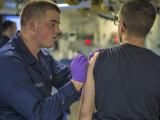Feb 6, 2003 (CIDRAP News) – With about 700 people vaccinated so far in the government's campaign to immunize frontline healthcare workers against smallpox, no adverse events have been reported, the head of the Centers for Disease Control and Prevention (CDC) said today.
In a telephone news briefing, Julie Gerberding, MD, said about 687 healthcare workers had been immunized as of yesterday. "No significant adverse events have been reported so far," she said, and quickly added, "Actually no adverse events."
The Department of Defense (DoD) reported last week that two significant adverse events had occurred among "tens of thousands" of troops vaccinated for smallpox since mid December. One soldier had generalized vaccinia and another had encephalitis, though it was uncertain whether the vaccine caused the latter, DoD said. Gerberding said both men were doing well at last report.
Also today, the CDC said it will rely on monitors at hospitals and other sites to electronically report significant reactions in all vaccinees. The plan for monitoring adverse events is described in the new issue of Morbidity and Mortality Weekly Report.
At the briefing, Gerberding said 18 clinics around the country are "actively engaged" in vaccinating healthcare workers. CDC spokesman Tom Skinner said states and cities that have started vaccinations are Colorado, Connecticut, Georgia, Iowa, Kansas, Kentucky, Los Angeles, Missouri, New Hampshire, New Jersey, New York State, North Carolina, Pennsylvania, South Dakota, Tennessee, Vermont, Virginia, and Wyoming.
The immunizations are the beginning of an effort to prepare the nation to deal with a potential terrorist attack with smallpox virus. When President Bush announced the plan in mid December, state smallpox response plans indicated that roughly 450,000 public health and hospital workers would get voluntary shots in the first phase of the effort. But workers have been slow to volunteer for the shots, largely because of worries about compensation for medical costs and lost wages if they suffer reactions to the vaccine.
"I think we recognize that concerns about compensation are resulting in people being slow to accept the vaccination," Gerberding said in response to a question today. But even if compensation were not a concern, the program would start slowly because the first step is "vaccinating the vaccinators," who will then vaccinate others, she said. "We actually are not surprised to see this rate of immunization," she said. "And I think we'll be able to scale it up after the vaccinators are vaccinated."
State workers' compensation programs are expected to be of some help to healthcare workers who have vaccine complications, but how much is unclear. Consequently, healthcare workers' groups have called for a federal compensation program, and congressional leaders and federal health officials have promised to come up with a plan.
But Gerberding offered no details on that effort today. "HHS [the Department of Health and Human services] is continuing to address the issue and I expect we'll be hearing something very soon," she said.
Gerberding said the CDC's goal in the immunization campaign is to have teams of immunized people who could respond to a smallpox outbreak, but there is no specific target number of vaccinated people. Despite numerous questions, she refused to suggest how many workers the CDC thinks it will take to achieve preparedness.
Though the states' smallpox response plans indicate that the vaccine will be offered to about 450,000 workers, she said, "The actual number who will get vaccinated, we know that number is significantly less than that. The actual number very much depends on the jurisdiction where the preparedness is being planned." For specific numbers, the states and cities are the best sources, she said.
In response to further questions about numbers, she said, "Preparedness is a process and not an event, and there's no absolute definition of preparedness."
Gerberding also said the CDC now has no specific target date for completion of the first round of vaccinations. As announced in December, the vaccination program calls for a second stage in which up to 10 million additional healthcare and emergency response workers will receive voluntary smallpox shots.
"There's not going to be a stop date when we say stage one is over and now stage two begins," she said. The goal is to complete the first phase as quickly as is safely possible, and the time will vary among states and cities, she added.
Earlier announcements had suggested that the first round of vaccinations could be accomplished in 30 days, but Gerberding said she doesn't expect that the first stage will be finished by the end of this month. The first vaccinations were given Jan 24.
The new MMWR report says the CDC and state health departments have set up "the Smallpox Vaccine Adverse Events Monitoring and Response System." The system is designed to gather information on adverse events that require hospitalization or outpatient care, contraindications identified after vaccination, and transmission of vaccinia to others.
Under the system, each person will get a unique identification number on the day of vaccination, and his or her vaccination information will be recorded in an electronic tracking system. After vaccination, "Monitors at hospitals and other locations should assess vaccination-site care, symptoms reported by the vaccinees, and vaccine take," the article says.
Monitors and healthcare providers should report significant vaccine reactions as they occur and ensure that information about them is added to the tracking system by the time follow-up is completed, usually 3 to 4 weeks after vaccination, the report states.
The article says the CDC and state and local health departments will use a secure Web-based communication network called the Epidemic Information Exchange (Epi-X) to share data on smallpox vaccine adverse events. Gerberding said the CDC hopes to present tabular data on the adverse events each Tuesday and Friday during the immunization campaign.
Healthcare providers who need help in evaluating a possible reaction to the smallpox vaccine should contact their state health department or call the CDC's Clinician Information Line at 877-554-4625, the report says.
See also:
CDC. Notice to readers: Smallpox Vaccine Adverse Events Monitoring and Response System for the first stage of the smallpox vaccination program. MMWR 2003;52(5):86-9, 99
http://www.cdc.gov/mmwr/preview/mmwrhtml/mm5205a5.htm


















